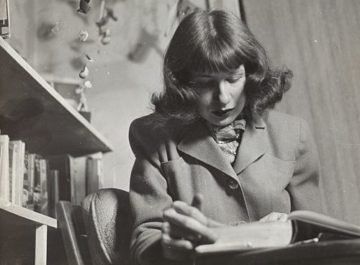Heather Clark at Poetry Magazine:
 “She had no sympathy,” Spiegelman tells us, “for people who paraded their inner misfortunes.” Clampitt’s dismissive attitude toward the self-indulgences of confessional verse, which commanded so much attention in the 1960s and 1970s, was a product, he writes, of “her stern midwestern upbringing.” And her models: Hopkins, Keats, Wordsworth, Dickinson, Millay, Swinburne. Clampitt returned to their lives again and again in her work, and their echoes sound in “The Kingfisher.” But T.S. Eliot also haunts the poem: memory and desire, European landscapes, breakdown, and even the nightingale recall The Waste Land. Clampitt knew it all. In 1956, she told her brother Philip that she could write a history of English literature from memory “and know just where to place everybody in it, with hardly any trouble at all. The reason being, apparently, that I feel I am in it.” Spiegelman notes the boldness of this claim, especially for a woman writer who did not publish her first poem until 1978.
“She had no sympathy,” Spiegelman tells us, “for people who paraded their inner misfortunes.” Clampitt’s dismissive attitude toward the self-indulgences of confessional verse, which commanded so much attention in the 1960s and 1970s, was a product, he writes, of “her stern midwestern upbringing.” And her models: Hopkins, Keats, Wordsworth, Dickinson, Millay, Swinburne. Clampitt returned to their lives again and again in her work, and their echoes sound in “The Kingfisher.” But T.S. Eliot also haunts the poem: memory and desire, European landscapes, breakdown, and even the nightingale recall The Waste Land. Clampitt knew it all. In 1956, she told her brother Philip that she could write a history of English literature from memory “and know just where to place everybody in it, with hardly any trouble at all. The reason being, apparently, that I feel I am in it.” Spiegelman notes the boldness of this claim, especially for a woman writer who did not publish her first poem until 1978.
more here.
